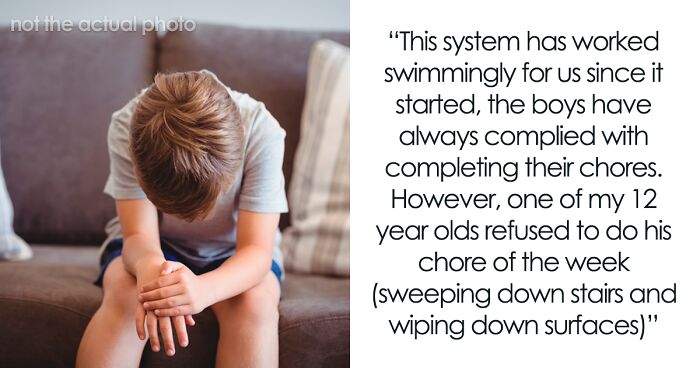
Boy Decides That Sweeping And Wiping Dust Are ‘Girl Chores’, Gets Taught A Lesson He Doesn’t Like
As anyone who’s ever been an adult can attest to, the chores never end. There’s always dust forming bunnies under the bed, and there will always be more dishes that need to be washed. The bathroom mirror will inevitably have water droplets splattered on it the day after you cleaned it, and the recycle bin will magically fill up 10 minutes after being emptied.
So when it comes to keeping your household clean, chores don’t discriminate. Nobody can get out of them, regardless of their gender. But after one boy suddenly decided his chores were “for girls,” his mom decided he no longer needed an allowance. Now, she’s wondering if she made the right choice, so below, you’ll find the full story, as well as conversations with Jane Shine of Positively Jane, and psychologist and parenting expert Emily Edlynn, PhD.
This mother gives her sons an allowance for helping out around the house
Image credits: Dimaberlin (not the actual photo)
But after one decided that boys shouldn’t have to clean, she decided that parents don’t have to pay either
Image credits: varyapigu (not the actual photo)
Image credits: MapCritical8176
“[An allowance] gives us an opportunity as parents to teach them about money and how to manage it”
To gain more insight on the topic of providing kids with an allowance, we reached out to Jane Shine of Positively Jane, who helps women find financial freedom and navigate life’s financial highway through her blog. Jane is passionate about “raising up a generation of kids who understand money,” and she was kind enough to have a chat with Bored Panda about her thoughts on allowances.
“As soon as kids understand that they need money for stuff, they need an allowance,” she says. “That can be as early as 2-years-old. Why? Because this gives us an opportunity as parents to teach them about money and how to manage it.”
“My kids got an age appropriate allowance, and they had to set aside money for savings, tithe, and spending,” Jane noted. “As they got older, that ’set aside’ money became more fine-tuned. And their allowances increased. It really helped them become the financially responsible adults they are today.”
We were also lucky enough to get in touch with Emily Edlynn, PhD, to hear her thoughts on giving kids allowances. Dr. Edlynn is a psychologist, parenting expert and author of Autonomy-Supportive Parenting: Reduce Parental Burnout and Raise Competent, Confident Children, and she says she’s a big supporter of paying kids allowances.
“An allowance gives kids the chance to practice important money skills they will need to be financially independent adults, like how to save money and understand value when making purchasing choices,” she explained. “In line with my book about supporting our children’s autonomy, being skilled with money grants us financial autonomy, so these skills are important to start teaching and practicing in childhood.”
Image credits: Karolina Grabowska (not the actual photo)
“You can also decide as a family how to manage increasing the allowance amount over time”
When it comes to the rules parents should keep in mind when giving their kids an allowance, Jane says it’s important to layout the chores and create age-appropriate tasks and levels of completion. “My kids had to make their beds from age 3, and the 10 year old did a much better job than the 3 year old,” she shared. “They had to clear the table, pick up toys, put back packs away, etc. I made a list for each.”
Dr. Edlynn says it’s important to come up with ground rules based on family values as well. For example, parents may decide that allowances can’t be spent on violent video games. “Many experts advise families to divide the allowance into three buckets: spend, save, and donate,” she added. “There’s not an exact formula for how to do this, but you could designate a percentage for each bucket.”
Jane also recommends having all of the chore rules laid out clearly, written down, gone over and signed by all parties, with a different agreement for each child. “This will eliminate all ‘he said she said’ arguments,” she noted. But Jane says it’s important not to be too strict when it comes to household chores. “I believe in grace,” she told Bored Panda. “Forgotten a few times or too busy, I get that… But blatantly not doing what is expected of them does not give them allowance.”
“You can also decide as a family how to manage increasing the allowance amount over time,” Dr. Edlynn says. “My family pays more at each birthday up to age 10 when they can figure out other ways to earn money. Some families may encourage their children to negotiate a ‘raise,’ another life skill!”
When it comes to tying allowances to chores, Dr. Edlynn says there are pros and cons. But she advises parents increase both with age. “Older children should have more chore expectations and be able to earn more money as part of gaining responsibility as they mature,” she explained. “This also gives younger children goals to aspire to as they watch older siblings do more around the house and earn more.”
Image credits: cottonbro studio (not the actual photo)
“As children age and have more ways to spend their own money, look for opportunities beyond allowance”
“Kids can be paid for regular chores or create a list of extra things they can do to earn money,” Jane shared. “My kids got an allowance for being a part of the family. As a wife/mom, I had an allowance to spend. My husband did too, ‘no questions asked’ money. None of our allowances were chore related. But if there is a child who refuses to chip in and help, then the parents need to figure out the appropriate method of discipline, withholding allowance or whatever works for them.”
Jane also noted that allowances should be based on “what the parents can afford,” rather than what the other kids get. “A parent should never compromise their own financial future by paying allowance.”
“As children age and have more ways to spend their own money, look for opportunities beyond allowance,” Dr. Edlynn recommends. “Maybe you offer a dollar amount for an extra task like organizing the den closet or pulling weeds. You can also encourage your child’s entrepreneurial spirit with babysitting or a leaf-raking business, so they can earn money from other people and not just you!”
We would love to hear your thoughts on this situation in the comments below, pandas. Do you think this mother was right to take away her son’s allowance, or was she being too hard on him? Then, if you’re interested in reading another Bored Panda article, we recommend checking out this one that also discusses providing kids with an allowance!
Image credits: cottonbro studio (not the actual photo)
Many readers assured the mom that she did nothing wrong, noting that she was only being fair
However, others criticized the mother for giving her children too many chores
Explore more of these tags
The YTA people are insane. A few chores every day is not the same as a "cleaning service".
Seriously. Getting $50 at week at 12 years old for sweeping is a lot of money.
Load More Replies...It depends on how you see money. I got $5 a day when I was twelve. That’s the equivalent to $16.63 today. Back then I thought $25-35 a week wasn’t enough and moaned about it.
Load More Replies...The YTA people are insane. A few chores every day is not the same as a "cleaning service".
Seriously. Getting $50 at week at 12 years old for sweeping is a lot of money.
Load More Replies...It depends on how you see money. I got $5 a day when I was twelve. That’s the equivalent to $16.63 today. Back then I thought $25-35 a week wasn’t enough and moaned about it.
Load More Replies...
 Dark Mode
Dark Mode 

 No fees, cancel anytime
No fees, cancel anytime 






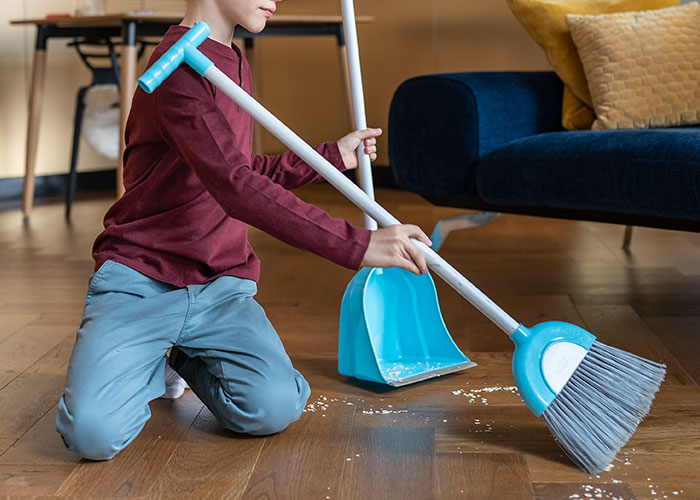
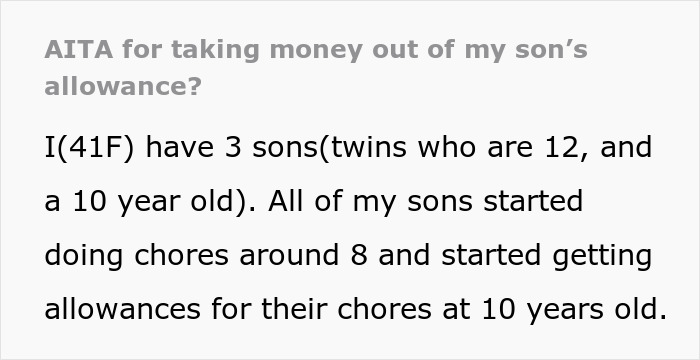
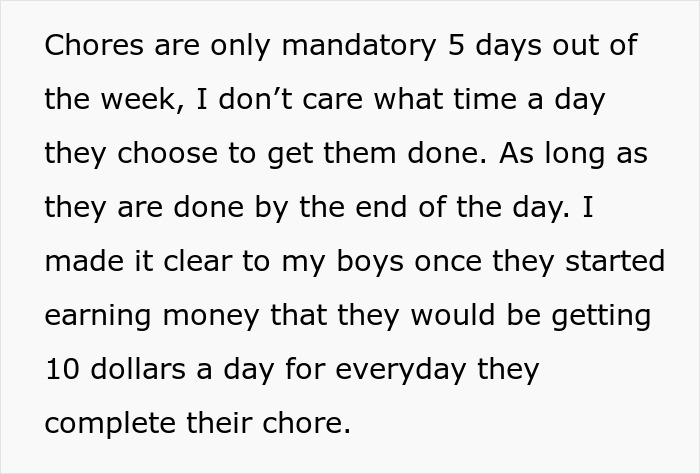
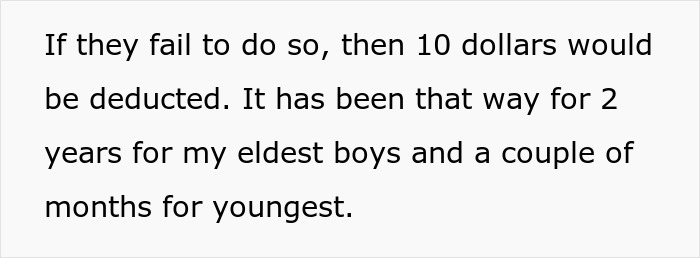
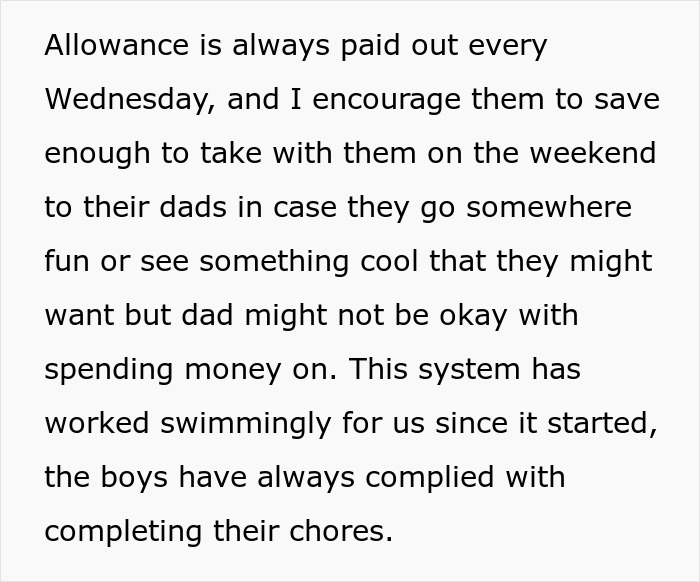


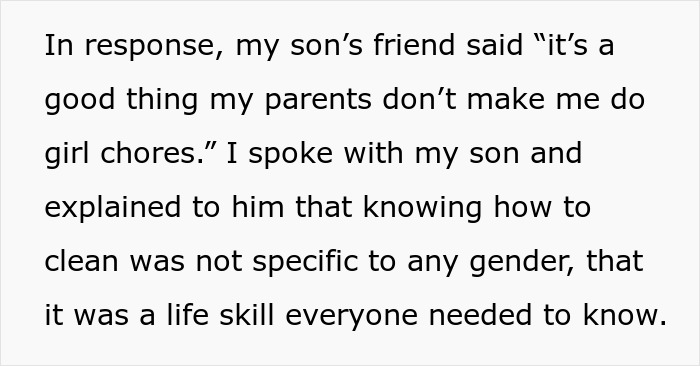


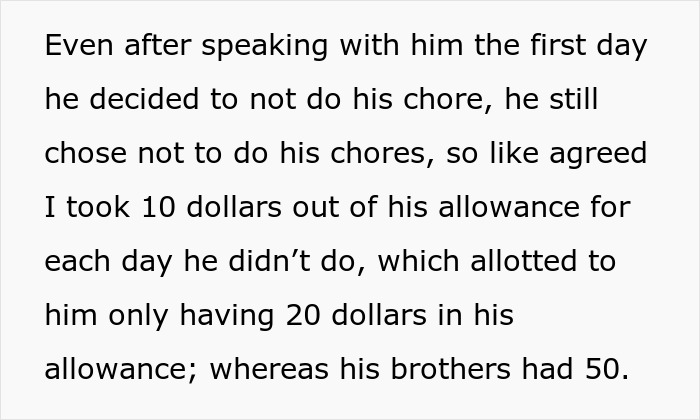
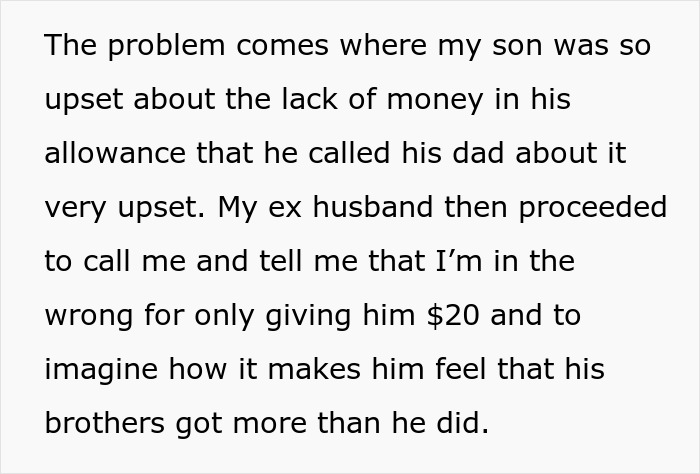

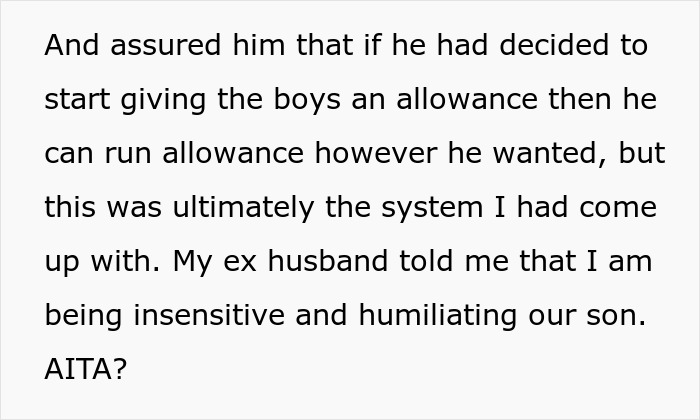

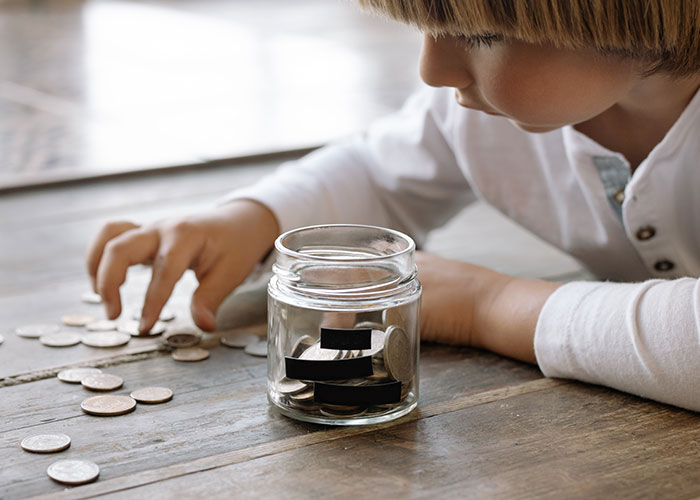
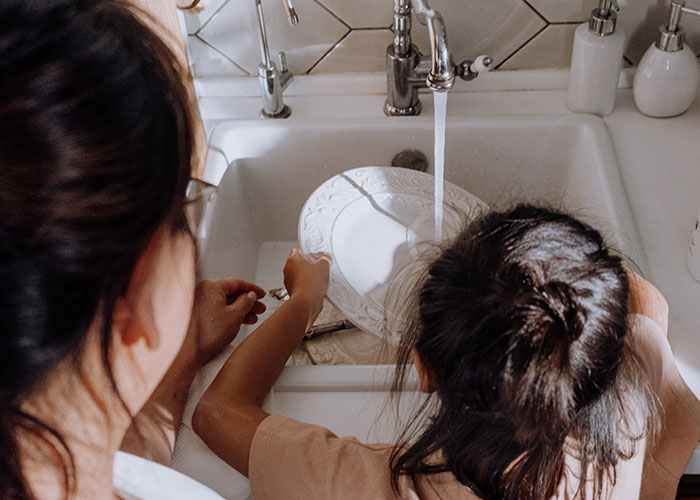


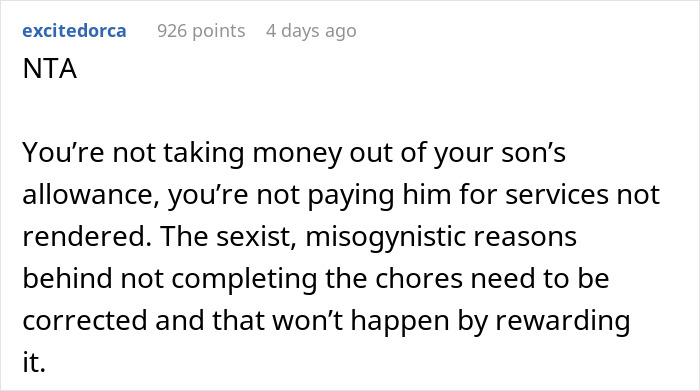
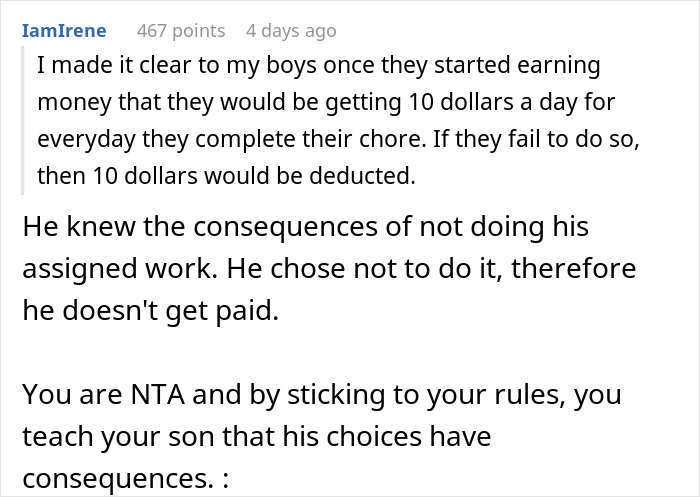
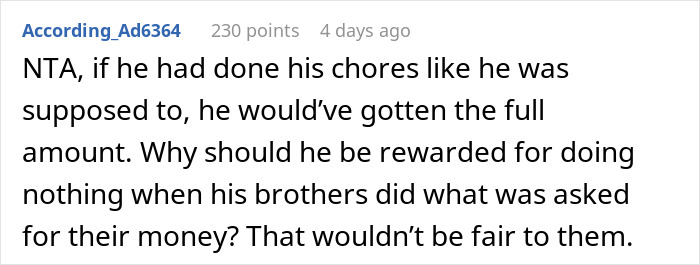
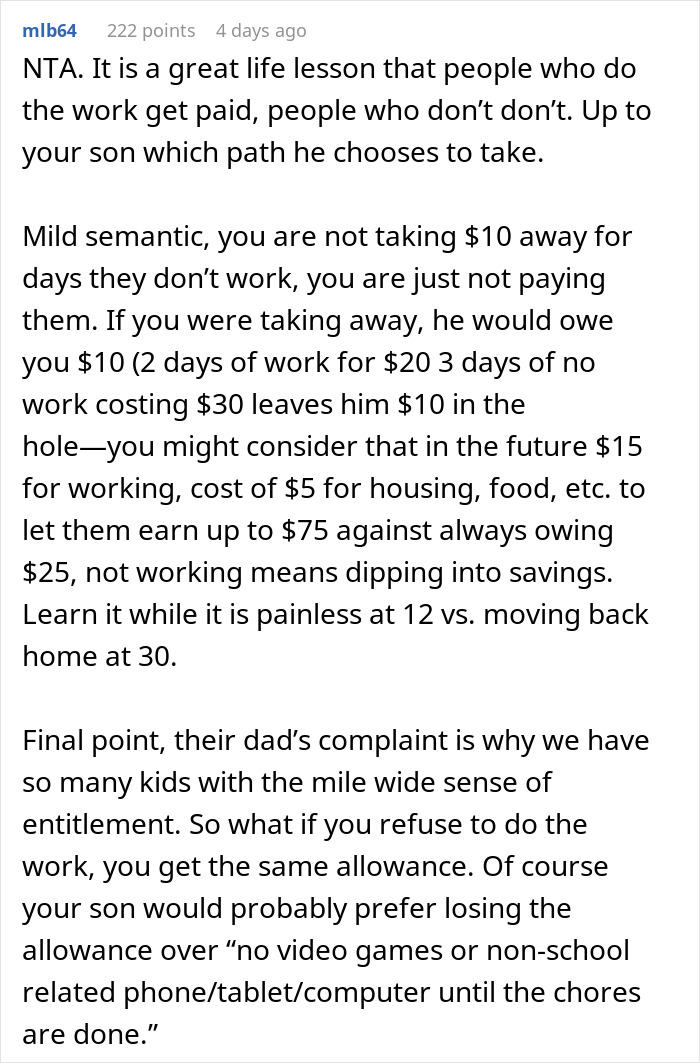


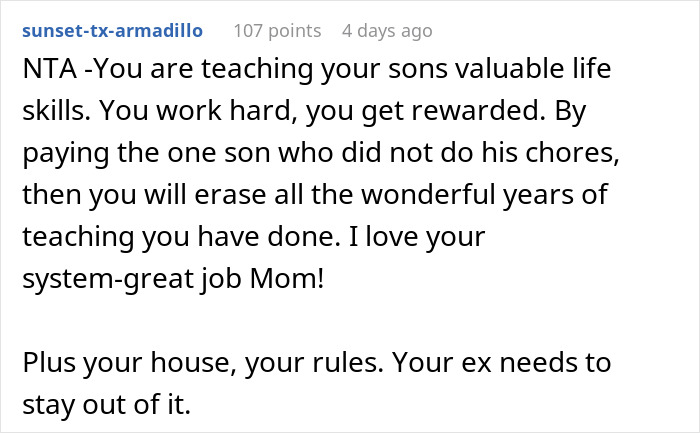
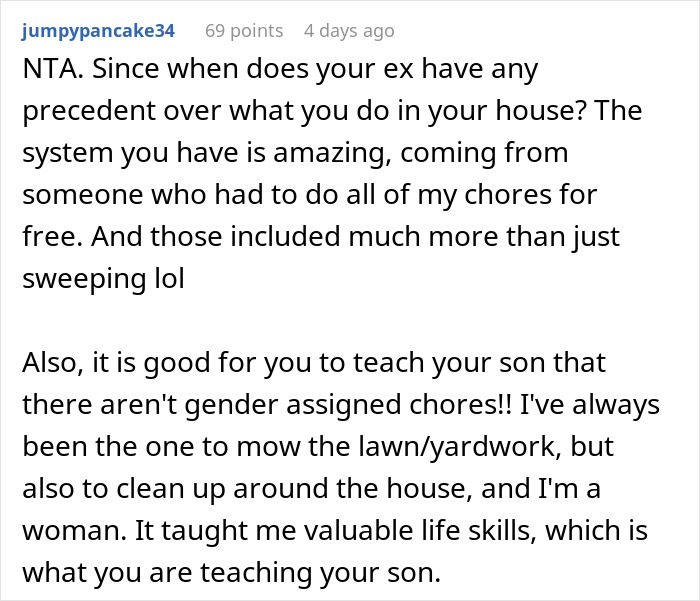



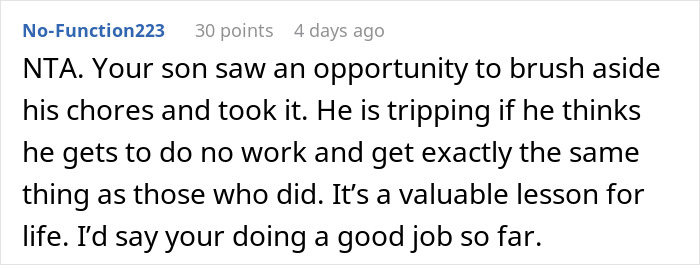


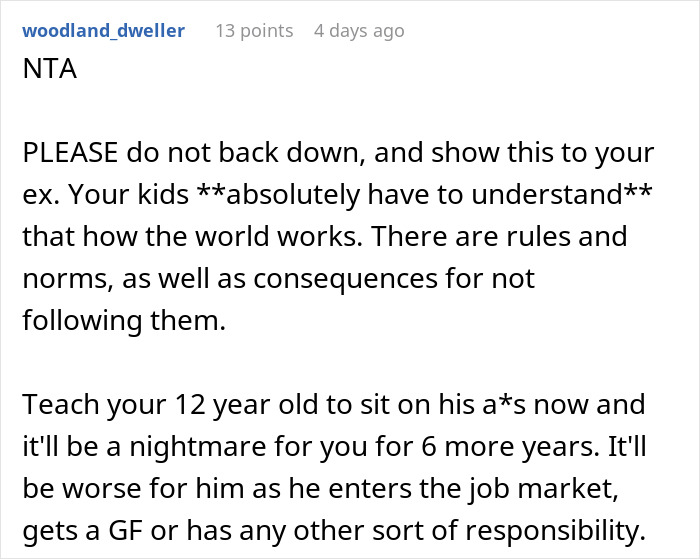
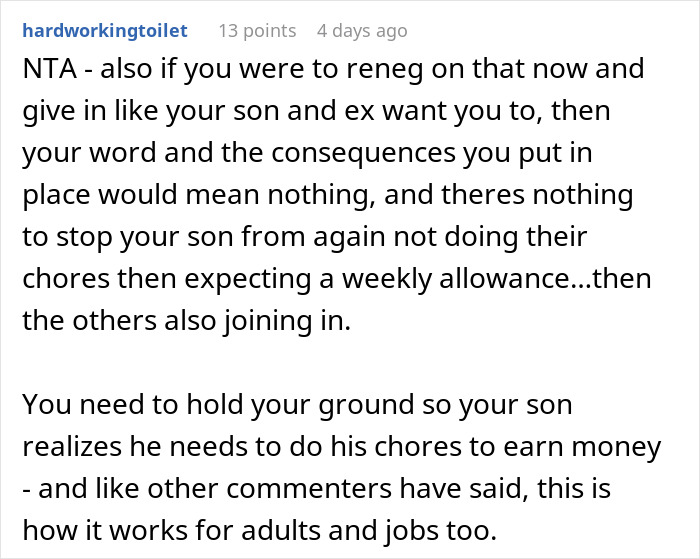
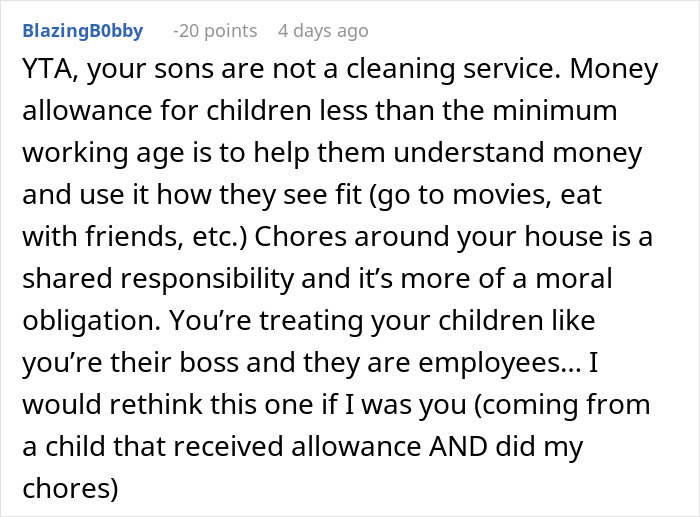
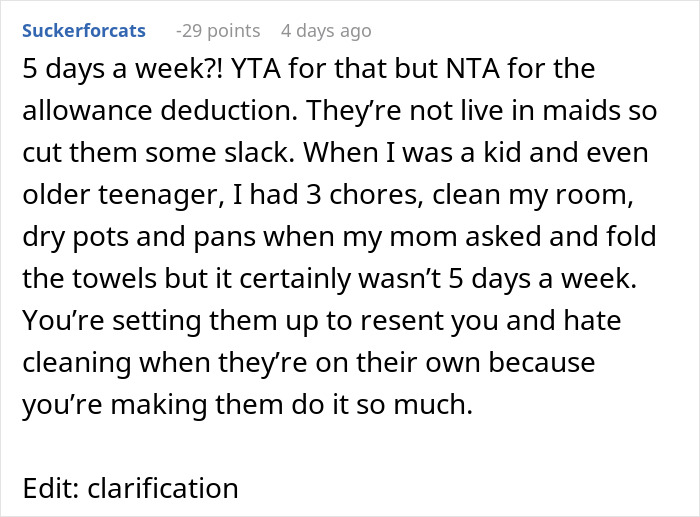
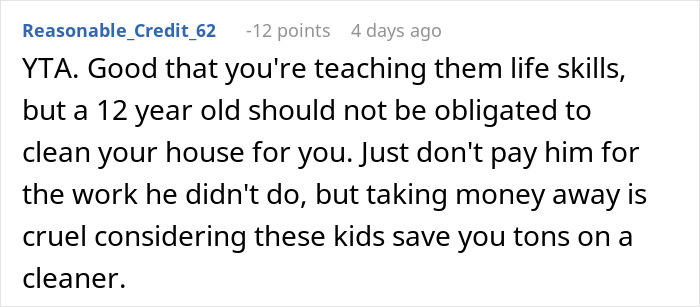









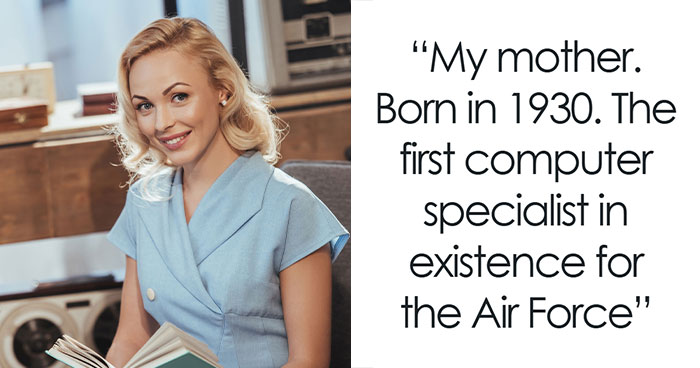


































90
133